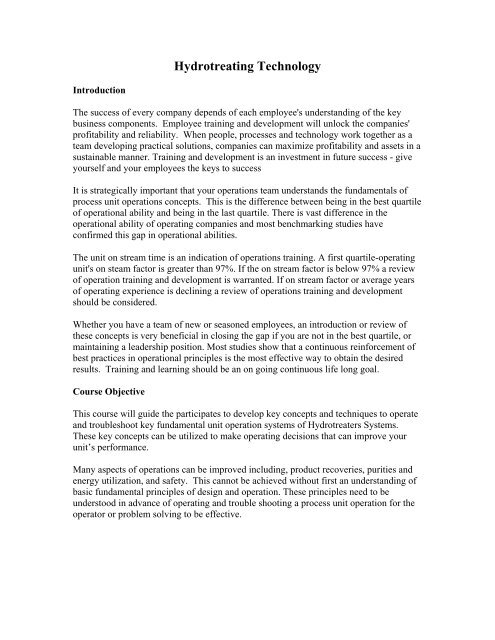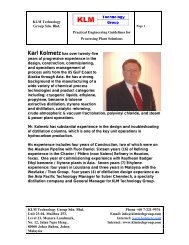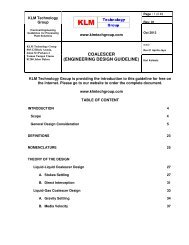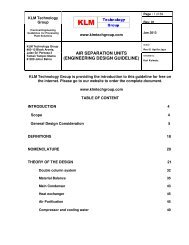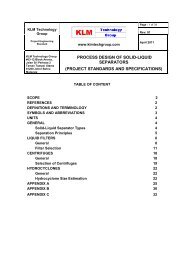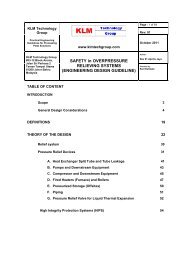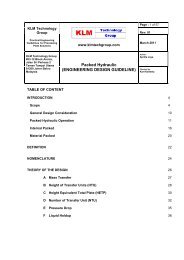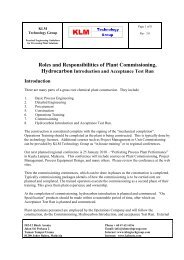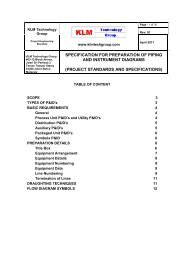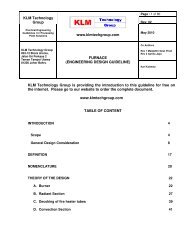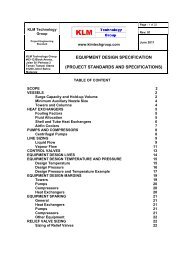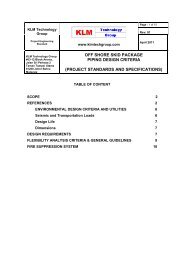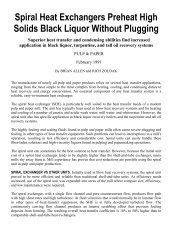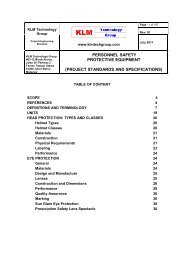Hydrotreating Technology Training
Hydrotreating Technology Training
Hydrotreating Technology Training
You also want an ePaper? Increase the reach of your titles
YUMPU automatically turns print PDFs into web optimized ePapers that Google loves.
<strong>Hydrotreating</strong> <strong>Technology</strong>IntroductionThe success of every company depends of each employee's understanding of the keybusiness components. Employee training and development will unlock the companies'profitability and reliability. When people, processes and technology work together as ateam developing practical solutions, companies can maximize profitability and assets in asustainable manner. <strong>Training</strong> and development is an investment in future success - giveyourself and your employees the keys to successIt is strategically important that your operations team understands the fundamentals ofprocess unit operations concepts. This is the difference between being in the best quartileof operational ability and being in the last quartile. There is vast difference in theoperational ability of operating companies and most benchmarking studies haveconfirmed this gap in operational abilities.The unit on stream time is an indication of operations training. A first quartile-operatingunit's on steam factor is greater than 97%. If the on stream factor is below 97% a reviewof operation training and development is warranted. If on stream factor or average yearsof operating experience is declining a review of operations training and developmentshould be considered.Whether you have a team of new or seasoned employees, an introduction or review ofthese concepts is very beneficial in closing the gap if you are not in the best quartile, ormaintaining a leadership position. Most studies show that a continuous reinforcement ofbest practices in operational principles is the most effective way to obtain the desiredresults. <strong>Training</strong> and learning should be an on going continuous life long goal.Course ObjectiveThis course will guide the participates to develop key concepts and techniques to operateand troubleshoot key fundamental unit operation systems of Hydrotreaters Systems.These key concepts can be utilized to make operating decisions that can improve yourunit’s performance.Many aspects of operations can be improved including, product recoveries, purities andenergy utilization, and safety. This cannot be achieved without first an understanding ofbasic fundamental principles of design and operation. These principles need to beunderstood in advance of operating and trouble shooting a process unit operation for theoperator or problem solving to be effective.
This seminar focuses on the core building blocks of the Hydrotreater process unitequipment. The program will emphasize process unit equipment fundamentals, safeutilization of these fundamentals by operations and maintenance personnel, andequipment troubleshooting techniques.The purpose of this seminar is to improve and update the participant’s personalknowledge of Hydro treating technologies and will include:• Naphtha HT• Kerosene HT• Diesel HT• Monitoring unit operations• Troubleshooting• Latest developments• Areas of concernOutline1. Background-development of Hydro processing.•Hydro processing Objectives.•Commercial History2. Process Fundamentals•Chemical reactions•Catalysts•Reaction Kinetics•Hydrogenation –Dehydrogenation Equilibrium•Reaction Selectivity•Multicatalyst Systems•Commercial Catalysts3. Process Design•Typical Processing Conditions•Reactor Systems•Flow Schemes•Design Considerations4. Process Capabilities•Feedstocks and applications•Hydrogen Utilization
•Product Qualities•Catalyst Consumption•Hydrogen Consumption•Utilities5. Cost and EconomicsWhat You Can Expect To Gain;• Overview of the Catalytic Processes in a Refinery, with a special emphasis onHydrotreaters Systems• Catalyst Evaluation Techniques• An understanding of Reactor and Catalyst interaction• The operation, control and trouble shooting of a reactor and associated heaters, heatexchangers and distillation equipment• An overview of reactors, practical solutions as well as theory• An understanding of essential reaction concepts• Valuable practical insights for trouble free design and field proven techniques forcommissioning, start up and shutdown of reactor, heater, heat exchanger and distillationoperations• To tailor your approach to specific design, analysis and trouble shooting problems.Course SyllabusThis suggested course is three to four days. The goal of the course would be to refreshthe knowledge of those who have a basic understanding of process operations and tobuild a foundation to those who are new to process operations.
Day OneIntroduction1. Refinery Overview2. Safety for the Process IndustryHydrogenation1. Introduction2. HistoryDay Two3. Process Overview4. Process Chemistry5. Feedstock, Reaction, Catalyst, RegenerationDay Three6. Process Variables7. Common Problems8. Advance in Cat DevelopmentDay Four9. Catalyst Evaluation Techniques10. Distillation Fundamentals11. Summary
Who Should Attend:• People who are making day to day decisions regarding operation, design, andeconomics of processing plants;1. 1 st Line Operations personnel,2. Operation Supervisors,3. 1 st Line Maintenance personnel,4. Maintenance Supervisors,5. Senior Plant Supervisors,6. Operations Engineers7. Process Support Engineers,8. Design Engineers,9. Cost Engineers.• Ideal for veterans and those with only a few years of experience who want toreview or broaden their understanding in Processing Plant Operations.Other professionals who desire a better understanding of subject


